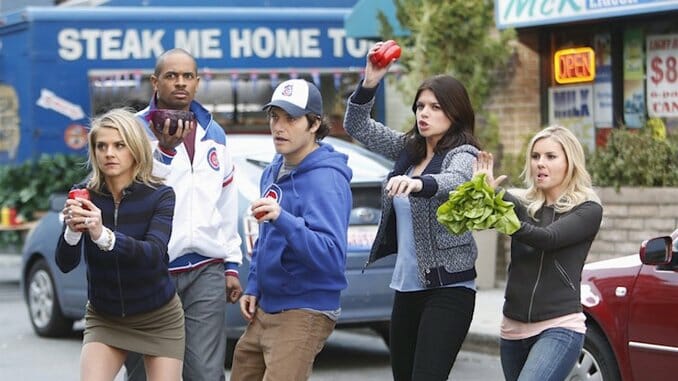TV Rewind: How Happy Endings Was Ahead of Its Time—and Ready for a Comeback
Photo Courtesy of ABC
Editor’s Note: Welcome to our TV Rewind column! The Paste writers are diving into the streaming catalogue to discuss some of our favorite classic series as well as great shows we’re watching for the first time. Come relive your TV past with us, or discover what should be your next binge watch below:
![]()
If anyone has ever tried to convince you to watch Happy Endings, they’ve probably described it as “a hangout comedy like Friends, but better!” or “a perfectly written show that only gets funnier every season.” Okay, you caught me—those are direct quotes from yours truly, but I stand by it. (Especially the part about it being better than Friends). The beloved ABC comedy about a group of truly weird pals in Chicago only lasted three perfect seasons, from 2011-2013, but has amassed a cultish following in the years since its cancellation.
During this year’s pandemic lockdown it even got the Zoom reunion treatment, with the cast gathering for a brand new episode set in quarantine—the result was arguably better than the reunions of favorites like 30 Rock and Parks and Recreation. It was seeing my friends back together onscreen, living through 2020 while still managing to get into ridiculous predicaments over video chat, that prompted me to revisit the series from the beginning. This is something I rarely do, even for my most favorite shows. But when I started, I was immediately reminded of how genuinely funny, well-crafted, and ahead of its time the show was.
Happy Endings was a critical darling, and has always been lauded for its three-dimensional characters. Max (Adam Pally) is gay but doesn’t fit naturally into the four walls of a stereotype; several episodes are spent interrogating which “type of gay” he is, without a straightforward conclusion. Brad (Damon Wayans Jr.), the only Black character in the main cast, is a goofy and heartfelt investment banker, and often the emotional center of the group. Penny (Casey Wilson) is a clumsy romantic who could easily be one-note, but is rounded out by a job she’s great at, a complicated family history, and a condo that2020-me is envious of.
The show pushes boundaries even beyond the careful craft of unique characters. Watching it in 2020 amidst a reckoning with diversity only solidified how progressive Happy Endings was for its time, and subtly highlights how much its contemporaries were running in place. The writers consciously featured cultural appropriation, inequalities within gender roles and racial injustice—conversations that seem to have only just started to take shape recently—and flipped them on their heads.
In the third season’s “More Like Stanksgiving,” Dave (Zachary Knighton) claims to be one-sixteenth Navajo, and is determined to throw the group an authentic Native American Thanksgiving. He barters his tassled suede jacket for the clams needed for his feast, and laments the fate of his ancestors who engaged in similar unequal trades. The cashier is quick to remind Dave that he is, in fact, white.
Happy Endings isn’t the first comedy to try to use Native American heritage to their advantage: Unbreakable Kimmy Schmidt famously gave a (white) character a Lakota tribe backstory, only to receive immense backlash at the careless representation. But on Happy Endings, the comedy comes from the ridiculous nature of Dave’s claim. While the group doesn’t dissect the offensiveness of Dave’s 23-and-me epiphany, they are quietly rolling their eyes and poking fun at how dumb he sounds. They let him continue on this path—not because it’s okay, but because they get sick pleasure from seeing their friends do questionable things.
-

-

-

-

-

-

-

-

-

-

-

-

-

-

-

-

-

-

-

-

-

-

-

-

-

-

-

-

-

-

-

-

-

-

-

-

-

-

-

-








































